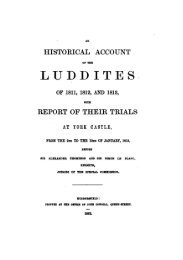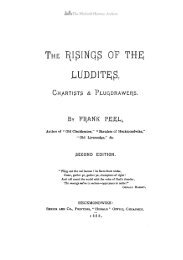OLD MIRFIELD DAYS - Mirfield - A Second Look
OLD MIRFIELD DAYS - Mirfield - A Second Look
OLD MIRFIELD DAYS - Mirfield - A Second Look
Create successful ePaper yourself
Turn your PDF publications into a flip-book with our unique Google optimized e-Paper software.
farm buildings, laithes, odd houses, one at Upper Hopton became famous as a meeting place, the<br />
Chapel near the river was born here, at Chapel Hill, as it became known. Richard Thorpe, a forerunner<br />
of the educationalists who were later to become more numerous, took part in the services I believe.<br />
Also the Ingham family from Blake Hall who were amongst the leading dissenters at the time. The<br />
Baptists, who came to life at this time, sometimes conducted their devotion actually on the riverside<br />
near the Corn Mill at New Gate, all these people were persecuted for their belief, it is hard to imagine<br />
people with feelings so intense today. One of the most important outcomes was the determination to<br />
improve life through learning, both spiritual and academic. It was a gesture of defiance, it was not the<br />
intention of the powers that be, that the masses should become aware, through the ability to say<br />
A.B.C.'s, or to count up to ten, of the state of the world generally. The good things that nature provided<br />
were a closed book to most people at this time, the bare necessities of life were the only things that<br />
counted. The provision of schools by these religious off shoots of the official Church were a gigantic<br />
achievement. Imagine the cash required to build a school similar to the Hopton Chapel School, a<br />
standing monument to the determination of these people, a perusal of the famous people who have<br />
passed through the doors of this building are amazing, long lists of men who have passed on to become<br />
important in the commercial life of the country, scholastic, banking, shipping, and public office<br />
generally. All taught by the masters and mistresses provided by the various Chapels, Churches were<br />
later to become involved. The Wesleyans School at Water Royd still continues to function, now of<br />
course under the wing (or foot; as you view the circumstances) of the Local Authority, personally I<br />
think It has a very good record. The school at Hopton operated on a ready cash basis, you paid your 2d<br />
a week, school wage it was called, and finished a good scholar, able to write copper plate when you<br />
were six years old, become an expert mathematician, skilled in the arts and also a good knitter, boys<br />
and girls alike. The teachers were very good, in my time the Kaye sisters (not the ones on television)<br />
Emma, Emily and Gladys were magicians, they taught every mortal thing, including singing, sewing,<br />
knitting, and painting any laggard on any subject rued the day. These lasses were dab hands at "braying<br />
it in" and bray it in they did, mostly by hand .sometimes with a stick, but they were respected and<br />
usually liked, they certainly produced results, I only came across one lad to whom reading and writing<br />
were as big a mystery when he left school as when he started. We daily are treated to long diatribes in<br />
the press, on the television or by the local clever clogs in the deterioration of the behaviour of children<br />
today, they are more violent than ever, they lack respect for their elders, in fact there is not much that is<br />
right about them. Listen to this; one afternoon, Mr. Edwards the school master, was taking a class in<br />
the classroom behind the gallery at Hopton, suddenly, there was commotion in the main room outside,<br />
Mr. Edwards left his class to investigate the affair, he found the teacher of the class on the floor,<br />
standing over him a big lad who was evidently the victor. Mr. Edwards stopped the fight, peace was<br />
restored and learning resumed.<br />
The teacher was called Frank Brooke, he left Hopton and became a policeman, a chief constable, an<br />
Inspector of Constabulary, a Knight and a lot more things. His opponent I have referred to in a<br />
poaching incident when he was "shanghaied" do you remember? I dare not tell you his name, he has<br />
relatives in the village. This incident would not be isolated although I am not suggesting that it was<br />
usual for scholars to set about the teacher, it happened nearly 70 years ago and was one of many affrays<br />
involving young people, I do not think that children are either better or worse than they ever were.<br />
Holidays were the things that were wholly good. A hot summer's day when you could dam the beck up<br />
at Collie Wood, take your boots and stockings off, your britches too if they got wet, paddle all day until<br />
you were dyed like a red indian with the ochre water and the sun, asleep in the long grass, drying your<br />
legs perhaps your bottom and tummy, listen to the grass drake calling in the field corner where you<br />
were laid, his next call at the other end of the field. Listen to the cuckoo, the thrush, the blackbird, hear<br />
the spink call "spink, spink" all day long, watch old Bonny the farm mare tossing her head incessantly<br />
to get rid of the flies—these were happy, happy days, and they cost nothing. They are all here today too<br />
but no longer fashionable. Not all, I am wrong, you can no longer hear the grass drake call, and only<br />
infrequently hear the cuckoo, one of my neighbours used to complain that we were "cuckoo'd to death<br />
and he'd screw his neck round it he could catch him." All these days were happy days, everything was<br />
geared to the speed of the horse it was a day's journey to Leeds, Bradford and Halifax, half a day to<br />
Huddersfield, a full day to Marsden or Slaithwaite or anywhere in the Colne Valley, and now another<br />
method of leisurely travel. I can remember my mother along with a lady called Mrs. Sykes and her<br />
husband William Sykes, travelling by a steam powered river yacht called "The Rook" tied up at a staith<br />
near the bottom of Boathouse Lane, they went to Stamford Bridge on the river Derwent, it was a lovely<br />
boat, everything so cosy, facilities for cooking, good seating and a fair turn of speed, measured, I<br />
presume in knots per hour or mile, I don't know, anyway, it was a great affair and lasted from Saturday<br />
dinner time until Sunday night when they duly disembarked at Burn's staith outside the Ship. This<br />
would be about 1904, it nearly sounds like a hundred years ago. The boat belonged to Joseph Wheatley<br />
29




